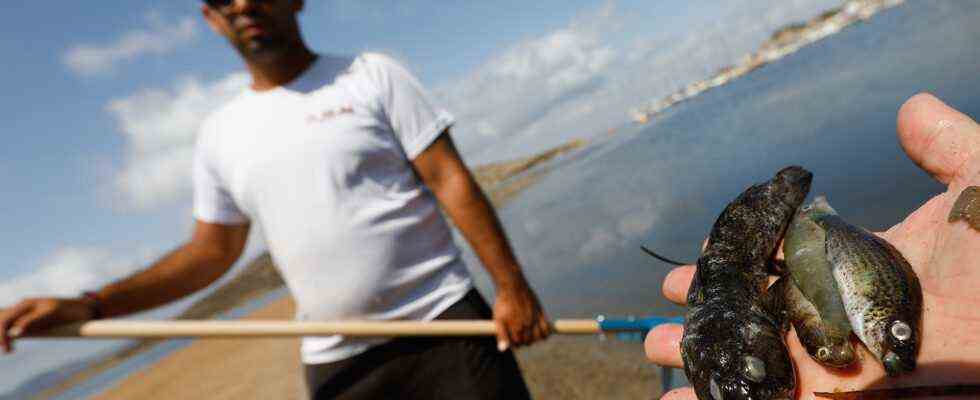Status: 08/25/2021 2:55 p.m.
The Mar Menor in southern Spain is Europe’s largest saltwater lagoon. Dead fish and marine animals have been washed up on the beaches there for days – around 4.5 tons in just one week.
Spanish television shows aerial footage of the Mar Menor, filmed from a helicopter. The water in the southern part of the lagoon is black. Lots of dead seaweed and other decay remains of plants and animals float around.
Up close, the full extent of the disaster becomes visible: María García from the Mar Menor community platform films with her mobile phone walking along a beach where buckets of dead fish have washed up. There are mainly small fish, but also a few larger ones such as sea bream or sole. “We local residents are outraged. We have such a natural gem here, and the politicians do not notice what is happening.”
Fish death has been a problem for years
The city of Cartagena has temporarily closed eight beaches. Fish death in the lagoon has been a problem for years, but so far on a less dramatic scale.
Thousands of fish perished in the lagoon in 2019. The authorities spoke of three tons at the time – one and a half tons less than had been washed ashore in the past few days. Environmentalists are furious that the scenes from yesteryear are repeating themselves. They accuse the government of the Murcia region of not doing enough to protect the Mar Menor – for example, ensuring that fewer agricultural pollutants get into the water.
Numerous people are now busy collecting the dead fish.
Image: REUTERS
Too much fertilizer, too high temperatures
The industrial cultivation of fruit and vegetables is an important branch of the economy in the region. When it rains heavily, mud with a thin content is often washed into the lagoon, says Julio Barea, a water expert at Greenpeace Spain. “In the specific case, we are talking about nitrates and phosphates. They ensure that algae can form explosively. These in turn use up practically all of the oxygen in the water. And that means that, in principle, no other living being can survive there.”
Then there are the high temperatures this summer; A few days ago they rose to over 40 degrees in the Murcia region. This makes the water in the Mar Menor warmer and the oxygen levels drop even further.
Regional government demands aid
The conservative regional government sees the weather as the main culprit – and the socialist central government in Madrid. Regional President Fernando López Miras says that it is not providing enough support. He demands that Spain’s Prime Minister Pedro Sánchez declare a disaster and thus release aid money. He finally promised that to the regions that were hit by the forest fires of the past few weeks. “According to the Prime Minister, support will be given to all areas that have been victims of natural disasters this summer. This must include the Mar Menor. So far, however, he has not reacted.”
Politicians in the region hope that Environment Minister Teresa Ribera will make firm commitments on her visit today. Many residents and conservationists, on the other hand, would like the regional politicians to act more themselves and not shift responsibility to Madrid.
The great fish death in Spain: The environmental disaster in the Mar Menor
Oliver Neuroth, ARD Madrid, August 25, 2021 1:13 p.m.

